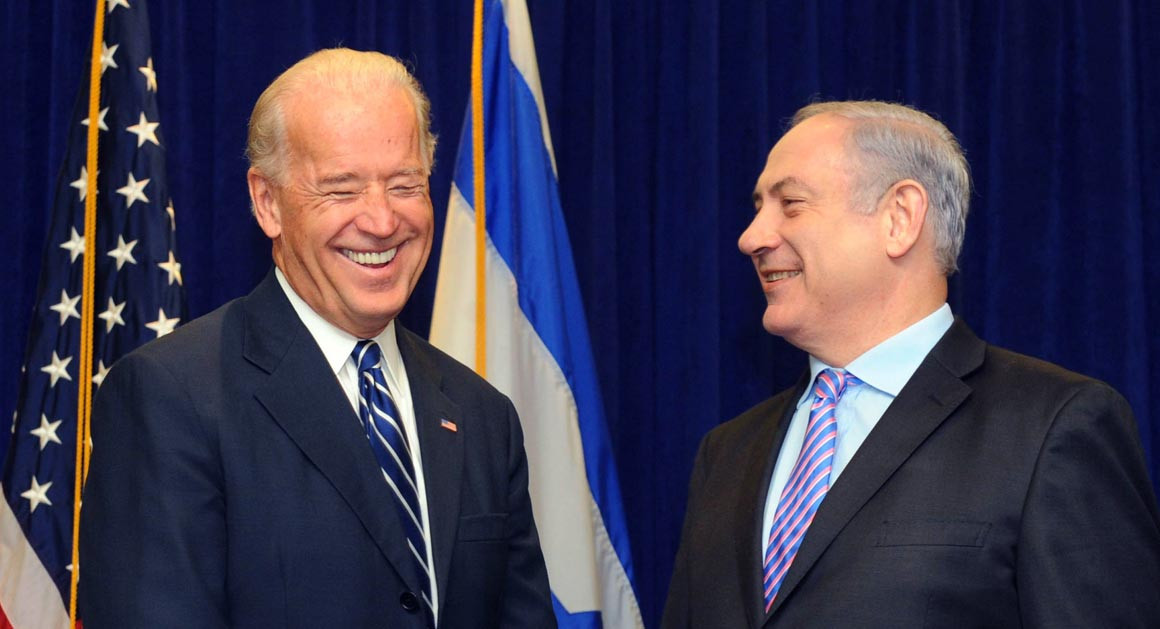The way things are going, the Israeli prime minister might prefer Biden over the current occupant of the White House
Haaretz
Exactly two years ago, not long after the ceremony marking the move of the U.S. Embassy to Jerusalem, just when it seemed ties between Prime Minister Benjamin Netanyahu and President Donald Trump were at their peak, someone whispered in closed conversations at the American pro-Israel lobby AIPAC that the Trump administration was not necessarily such a good thing for the Netanyahu government.
“Trump is unpredictable, he didn’t come out of traditional American politics, he’s not at home in AIPAC and he’s much more influenced in Washington by the evangelical lobby. Netanyahu will have to praise him and yet be careful with him at the same time and it won’t be so easy.”
That was the prediction, and it was correct. The sale of the F-35 jets to the United Arab Emirates, whether it happens or not, is just the most recent example of the acute complexities of the relationship.
All through Trump’s term in the White House, Netanyahu has tried as hard as possible to create the impression of warm, close, unshakable friendship. But the reality was not always as simple as in the billboards. Behind the scenes, Trump surprised Netanyahu many times with unexpected statements and requests that contradicted his declared policy, and many efforts were needed, overseen by the U.S. ambassador to Israel, David Friedman, and Israel’s ambassador to Washington, Ron Dermer, to iron out all the wrinkles over the years.
As early as the first joint press conference between Trump and Netanyahu in 2017, it could be seen that Netanyahu, master of talking points, stuck close to the script he had prepared, while Trump, master of shooting from the hip, made Netanyahu uneasy in front of live cameras.
He told Netanyahu: “I’d like to see you hold back on settlements for a bit.” He also explained that although it really made no difference to him whether there were one or two states in our region – the two-state solution “looked like it will be the easier of the two.” That statement made Netanyahu chuckle a bit, as if it were said in jest.
Since then, there have been numerous public events like that, especially the meeting at the United Nations where Trump continued to clarify in front of the cameras that he prefers the two-state solution, as eventually became clear, and in interviews in which he said: “The settlements are something that very much complicates and always have complicated making peace, so I think Israel has to be very careful with the settlements.”
Even the gift that was considered the greatest of all to Netanyahu, and was marketed as a personal favor, the move of the U.S. Embassy to Jerusalem, Trump said he had done “for the evangelicals,” who “were more excited about it than Jews.”
Netanyahu himself sometimes, in passing, revealed the difficulties. For example, when on his visit to Lithuania he said at a press briefing with a smile that he saw “no urgency” in advancing Trump’s peace plan. Maneuvering the elements of this deal did indeed require enormous energy from Netanyahu that he would have preferred not to waste. But in the end he managed to sell Trump’s two-state solution to his right-wing base as sweet lemonade, with the help of the annexation spin.
The F-35 aircraft, which will or will not be sold to the UAE, is another peek at these difficulties, which have mostly taken place behind the scenes. After all, Netanyahu is locked in: He can’t attack his friend Trump publicly under any circumstances. Everything has to be resolved quietly. From the details and evidence known so far, it seems that the UAE and the United States have been pressuring Israel for a long time now to agree to the deal.
This has emerged both from remarks by the Emirati foreign minister and from Netanyahu’s taking the trouble to release long, detailed documentation of his opposition to the deal. Why all these meetings on the matter?
Because there was American pressure.
Now it turns out that whether Netanyahu gave silent consent or not, Trump doesn’t necessarily care. “They have the money and they would like to order quite a few F-35s,” he said, his eyes gleaming. “We’ll see what happens. It’s under review,” he added.
In light of all this and more, one may certainly imagine a scenario in which, very quietly, at night before he goes to sleep, Netanyahu is secretly waiting for Joe Biden. The Democratic presidential nominee and his vice-presidential candidate, Kamala Harris, are much easier for AIPAC to maneuver and have a proven record of support for Israel.
True, they won’t pull a gesture out of their sleeve like a new embassy, and it’s also true that there is a wing of the Democratic Party that is very critical of Israel, partially because Netanyahu’s backing of Trump spurred opposition. But they are much more conventional, predictable and easier to work with. Especially for those who know American politics like Netanyahu. If Netanyahu survives another election and Biden is elected, it won’t be as terrible for him as he wants it to appear.
